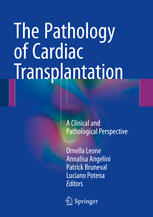

Most ebook files are in PDF format, so you can easily read them using various software such as Foxit Reader or directly on the Google Chrome browser.
Some ebook files are released by publishers in other formats such as .awz, .mobi, .epub, .fb2, etc. You may need to install specific software to read these formats on mobile/PC, such as Calibre.
Please read the tutorial at this link: https://ebookbell.com/faq
We offer FREE conversion to the popular formats you request; however, this may take some time. Therefore, right after payment, please email us, and we will try to provide the service as quickly as possible.
For some exceptional file formats or broken links (if any), please refrain from opening any disputes. Instead, email us first, and we will try to assist within a maximum of 6 hours.
EbookBell Team

4.8
34 reviewsThis is the first book to focus entirely on the role of pathology in cardiac transplantation, linked to the clinical perspective through clinical–pathological correlation, multidisciplinary team working, and collaborative research. It provides a scientific framework with up-to-date pathological protocols and classification schemes and guides the reader through the chronological phases of the transplant process in a step-by-step approach. Topics include end-stage heart failure with pathologies encountered in the native heart, current issues surrounding donor selection, the multiple faces of rejection pathology correlated with clinical management and immunology, other post-transplant complications, details of pediatric and combined heart/other organ transplantation, and a useful practical appendix. Many high-quality images and illustrative cases are presented, along with learning points and ample references.
Transplantation medicine today is continuously changing as collaborative research into novel diagnostic techniques and immunosuppressive therapies translates into improved recipient management and survival. This book is aimed at practicing transplant pathologists and specialist trainees. It will also appeal to general pathologists and to physicians and surgeons involved in cardiac transplantation who need to understand the role of pathology in the clinical management of transplant recipients.